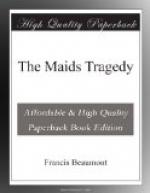|
This section contains 6,598 words (approx. 22 pages at 300 words per page) |

|
SOURCE: "Divine Right and Divine Retribution in Beaumont and Fletcher's The Maid's Tragedy," in Shakespeare and Dramatic Tradition: Essays in Honor of S. F. Johnson, edited by W. R. Elton and William B. Long, University of Delaware Press, 1989, pp. 246-63.
In the essay below, Broude examines Jacobean views on providence, justice, and the divine right of kings as depicted in The Maid's Tragedy.
We are accustomed to regarding The Maid's Tragedy (ca. 1608-11) as a play about the divine right of kings. The immunities conferred by kingship have a prominent part in the play, and the dilemma faced by the play's central character, Amintor, depends upon a conflict between the code of personal honor and a concept of monarchy that holds the person of the king to be inviolable.
Surprisingly, in view of the importance that the theme of kingship—or, more specifically, regicide—is thought to have...
|
This section contains 6,598 words (approx. 22 pages at 300 words per page) |

|


